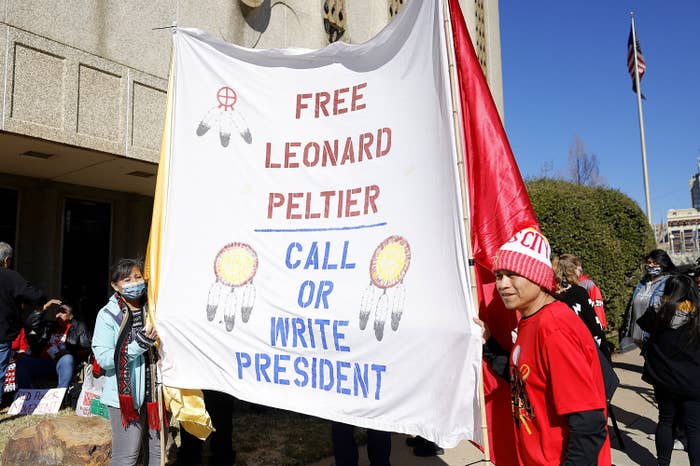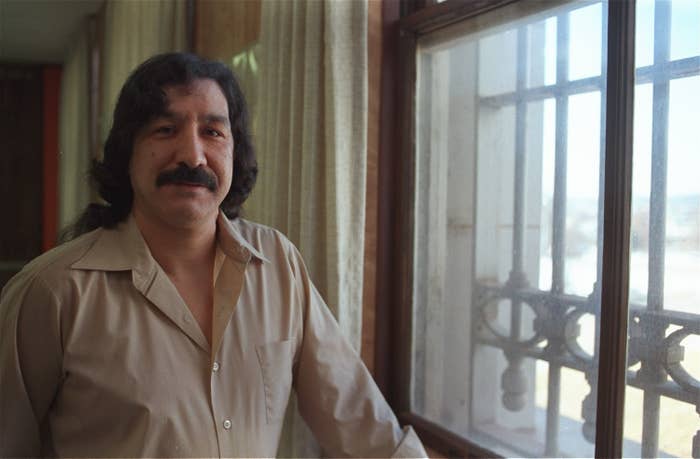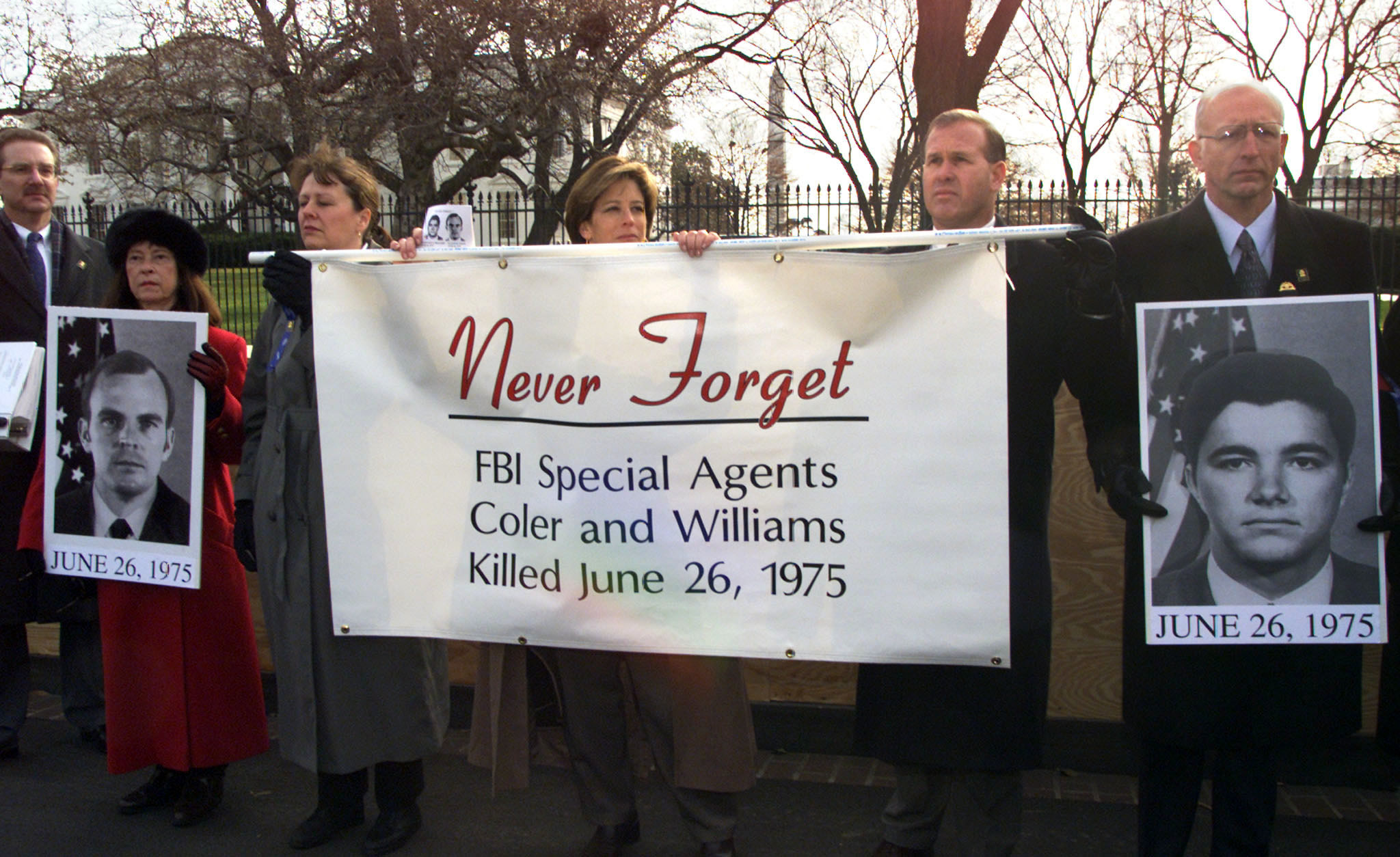
Supporters of a Native American activist who has spent more than 40 years behind bars for a crime he says he didn't commit have ramped up their push for clemency after he recently tested positive for COVID-19.
Leonard Peltier is serving consecutive life sentences in a high-security Florida prison for the murders of two FBI agents in a 1975 shootout on the Pine Ridge Reservation in South Dakota. For decades, he and his supporters have lobbied for his sentence to be reduced, arguing that his conviction was based on lies, threats, and faulty evidence.
Now that the 77-year-old activist, who has diabetes and an abdominal aortic aneurysm, has COVID, it may be his last chance at freedom.
"Time will be of the essence if he turns south quickly," his attorney and former US District Court judge Kevin Sharp told BuzzFeed News. "He could get it again. How many times can he take this before he can’t take it? He got life, not death."

A prominent member of the Indigenous rights group American Indian Movement, Peltier had traveled to Pine Ridge in 1975 to assist members of the reservation amid tensions between those who supported the tribal government and those who supported AIM. Formed in the 1960s, the group sought to draw attention to police brutality and discrimination against Indigenous people and stand up for their rights under the treaties between the US government and Native American tribes.
While Peltier has admitted he was present at the June 26, 1975, shootout that resulted in the deaths of FBI agents Jack Coler and Ronald Williams as well as a Native American man named Joseph Stuntz, he has long maintained his innocence. More than 40 people were involved in the gunfight, but only Peltier and three others were ever charged. Two of his codefendants were acquitted on the basis of self-defense, while the charges against the fourth were dropped. Stuntz's death was never investigated.
Peltier is considered by many to be a political prisoner due, in part, to the ways in which his case was prosecuted. Officials were never able to prove that Peltier fired the fatal shots that killed the agents. Instead, prosecutors relied on testimony from supposed witnesses who later recanted their statements, saying that FBI agents threatened and coerced them into lying. Years after Peltier was convicted, it was revealed that the government withheld a ballistics report that showed the shell casings collected from the scene didn't come from his weapon, according to his attorney.
"The president has the power under the Constitution to fix this today," Sharp said. "[The Bureau of Prisons] can fix it by sending him ... for home confinement or compassionate release. And it's so easy that if you're not doing it, it's politics."
In recent days, Native state lawmakers and members of Congress, including Sen. Patrick Leahy, have made personal appeals to President Joe Biden to release Peltier. "He is exactly the kind of individual who should be considered for clemency," Leahy said in a statement.
Even actors like Susan Sarandon and Danny DeVito have urged Biden to let him go.
"You can do it man," DeVito tweeted. "Pick up that pen."
President Joe Biden. Please let Leonard Pleltier go. You can do it man. Pick up that pen.
As first reported by HuffPost, Peltier tested positive for COVID on Jan. 28 and was dealing with a painful, persistent cough, according to his attorney. Although he did receive his first two doses of the vaccine, Peltier did not receive a booster shot before he got sick, despite being eligible for one.
On Monday, Sharp said he has not been able to get updates on Peltier's condition since last week.
"I have no idea how Leonard is doing because no one has spoken to me," he told BuzzFeed News.
In response to BuzzFeed News' questions, a White House official acknowledged Peltier's request for clemency and the public support to release him and said all requests for pardon or commutation go through the White House Counsel’s Office.
"I don’t have more to share on Mr. Peltier’s request at this time," they said.
A spokesperson for the Bureau of Prisons declined to comment on Peltier's case, but said the agency cannot act alone to reduce an inmate's sentence, noting that the BOP director must ask the prosecuting US attorney's office to file a motion to do so.
The FBI and the Department of Justice declined BuzzFeed News' requests for comment. But a former FBI agent who monitored the case for the last 15 years said the agency would probably be unsupportive of releasing Peltier.
"I can't speak for the FBI, but I can tell you from my past experience the FBI was — and probably continues to be — opposed to any clemency being granted and any consideration being given to Peltier getting out of [prison]," retired assistant special agent in charge Bob Perry told BuzzFeed News.
In December 2000, after then-president Bill Clinton said he would consider Peltier's request for clemency, FBI agents took the unusual step of staging a rally outside the White House in protest.

Perry said he still believes the evidence supports Peltier's conviction and that granting him clemency for a crime he still has not accepted responsibility for would be wrong.
"I think the record — the real record of evidence and court cases and appeals — is very clear, and I would be very surprised if they granted him any kind of consideration," he said.
But for the Native American community, releasing Peltier could give them some hope that justice is possible after centuries of violence against their people.
"Sometimes they have to admit their wrongs. We all have to," Jean Roach, a survivor of the 1975 shootout and codirector of the International Leonard Peltier Defense Committee, told BuzzFeed News. "It's time that the United States government admits their wrong of how they’ve treated their people. And start by releasing Leonard Peltier, giving back our land — there's so much that they could do."
Over the years, Peltier's struggle for freedom has been a popular cause, capturing the attention — and support — of well-known global figures like Pope Francis, the Dalai Lama, Nelson Mandela, and Coretta Scott King. In 2017, former US attorney James Reynolds, who oversaw the posttrial motions and appeals in Peltier's case, came out in support of clemency. In a letter to Biden last year, Reynolds said he had come to realize that Peltier's prosecution and continued incarceration "was and is unjust."
Still, the new surge of support feels different and much more widespread, Roach said. She credits the protests against the Dakota Access Pipeline at the Standing Rock Indian Reservation and the racial justice movement sparked by George Floyd's murder as factors in raising the public consciousness about the historic and ongoing injustices against Native Americans.
"People are seeing the inside of the racism that we experience," Roach said. "We’ve been attacked for a long time, and nobody cared. Now they have to care because they can't ignore us no more."
